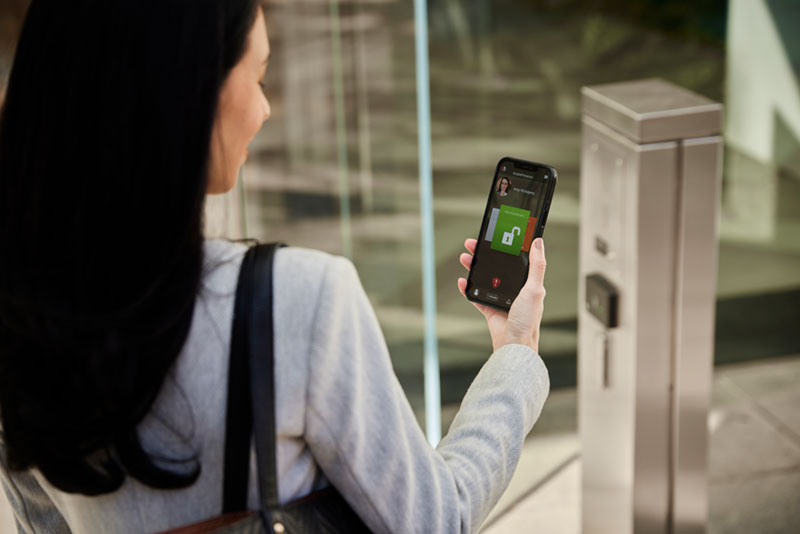The office environment is going to look a lot different than it used to in the months to come.
While some companies are planning to return to a five-days in-office work week, a larger number are open to a hybrid model – where workers spend some of their time at a central location (focusing on creative work, collaboration and culture building) and the rest working remote. That’s going to upend a lot of elements, including access control, identity management and security.
Fortunately, the solution to a lot of those problems is already in most company’s hands, as well as those of their employees. Mobile access control via smartphones gives managers significantly more control over who is and isn’t in the building. And it gives employees some peace of mind that their well-being is protected.
For instance, as some companies return to work, they’re putting conditions on the circumstances under which employees are allowed into the office. With mobile access, building credentials can be turned off nightly and not reinstated until the worker has met those criteria, perhaps by answering a quick daily health questionnaire.
Keep in mind, also, that current assumptions of one person/one desk/one parking spot may no longer apply in a hybrid world. Companies may reconfigure or even reduce their office space as leases come up. Some offices are likely to require employees to make a reservation for desk space or meeting room space before they come in. Mobile acts as a way to gather information to see who is coming in – and ensure there’s adequate space for them, so the office won’t be overcrowded, per any established safety protocols.
On a broader scale, though, mobile access removes a great deal of coordination friction from the process in a number of scenarios. A temporary employee, for instance, would typically have to find a specific person at the office to get a physical object, such as a card or fob, that would give them access to the building and their office. Using mobile access control, those rights can easily be granted on a provisional and limited basis in real time, saving everyone the inconvenience. Visitors, also, can benefit from this, with their clearances being established in advance.
The conveniences also extend to existing workers. It’s easy to rush out of the house or the office and forget to bring the fob that gets you in and out of the building. And people frequently lose their access cards. Mobile phones, though, are integrated into our lives to a point that they are rarely more than an arm’s length away. And if you do lose your phone, you know it immediately.
Adopting a mobile-centric access system additionally makes it a lot harder for unauthorized people to get into the building, again because of how closely people watch their phones. It’s also harder for bad actors to copy someone’s access credentials.
Depending on the level of security needed, mobile access offers a range of options. At its core level, you can arrange for hands-free access, where the person entering an area only needs to hold their phone up to the reader. And in some cases, the phone and door can communicate without the user having to even take the phone out of their pocket or purse, gaining them immediate entry.
For more sensitive areas, businesses can arrange that the phone owner must unlock their device before it allows access. And even more secure areas can demand a Face ID confirmation or a special PIN be entered on their phone before a room unlocks.
Of course, integrating mobile into access control opens up a number of other amenities for tenants. That same app can be used for things like booking a conference room, ordering catered food, dry cleaning pickup and more. Because it’s a recurring app experience, companies can build amenities on top of the access control element, making it even more convenient.
Tenant amenities are going to be increasingly important as businesses determine what a return to the office means for them. We expect to see a flight to quality, especially as leases come up for renewal and many companies reduce their footprint. Since they’ll be using fewer square feet, some businesses will be willing to pay more for quality and convenience, whether that’s reduced parking rates or the ability to use space in one of the building owner’s other properties when needed.
Mobile access could be the key to that, not only getting tenants in the door, but becoming the reservation system they use before they go in. People can find their team, select their space and follow whatever procedures the company has in place. And that can all be wrapped into the mobile experience, utilizing tools tenants not only already possess, but also that they safeguard as one of their most valuable possessions.
